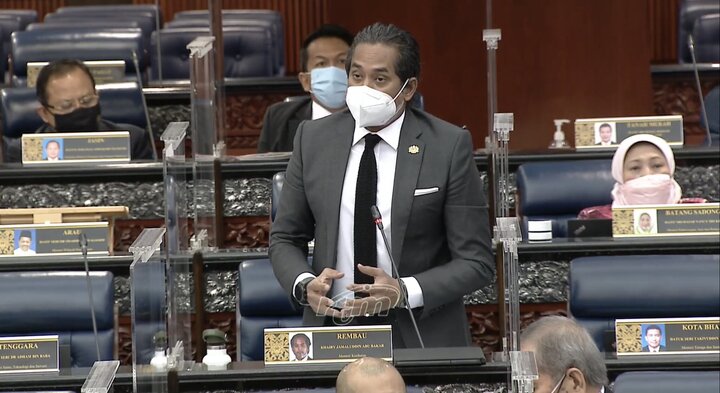KUALA LUMPUR, Sept 14 — The Ministry of Health (MOH) is considering designating special non-Covid hospitals to perform procedures or surgeries deferred during the pandemic, after more than 60 per cent of adults are fully vaccinated against Covid-19.
This initiative will also consider the declining rate of critical coronavirus cases in the country this month, Health Minister Khairy Jamaluddin told Parliament today.
As of yesterday, about 75 per cent of Malaysia’s adult population have completed Covid-19 vaccination, whereas the majority of states have completely inoculated more than 60 per cent of their adult residents.
Only Pahang (58.4 per cent), Perak (55.7 per cent), Kedah (55.2 per cent), Kelantan (53.2 per cent), and Sabah (51.2 per cent), have fully vaccinated less than 60 per cent of their adult populations.
The health minister also said MOH is working with 76 private hospitals throughout Malaysia to treat non-Covid patients during the Covid-19 pandemic, but did not reveal the total number of backlogged surgeries and procedures in public hospitals to date.
According to Khairy, MOH has outsourced a total of 3,974 procedures to private hospitals as of July 31.
“The outsourcing process is implemented in stages, according to the need and current capacity of the ministry based on the criteria of the cases that have been identified,” Khairy told Parliament today during Ministers’ Question Time.
A global study by CovidSurg Collaborative that was published in the British Journal of Surgery in May last year projected a backlog of 151,717 surgeries in Malaysian hospitals during a 12-week period of hospital services’ disruption due to the Covid-19 epidemic.
The study revealed that 70.9 per cent of overall surgeries, including benign diseases, cancer surgery and obstetrics, were cancelled during the early stages of Malaysia’s Covid-19 outbreak and Movement Control Order (MCO) conditions last year.
Malaysia’s coronavirus epidemic worsened significantly this year compared to 2020, as public hospitals in the Klang Valley were overrun with Covid-19 patients in July and August. The epicentres have now shifted outside the commercial region, as hospital beds and intensive care units (ICU) for Covid-19 cases are over-capacity in Johor, Kedah, Penang, and Kelantan.
Khairy added that although the country was hit by the Covid-19 pandemic, MOH did not stop or reduce services to non-Covid patients, especially for emergency and semi-emergency cases.
The health minister was answering a question raised by Sungai Siput MP Kesavan Subramaniam on the initiatives carried out by MOH to provide sufficient treatment to non-Covid patients during the coronavirus epidemic.
Khairy ensured that MOH has prepared a plan to make sure that non-Covid patients get proper treatment by implementing some intervention measures. That includes:
- Extension of operating hours of specialist clinics and operating theaters after operational hours (office hours), including on Saturdays, for certain hospitals.
- Optimising the use of non-specialist hospitals and Malaysian Armed Forces hospitals to carry out procedures or specific surgeries through a cluster hospital concept.
- Mobilisation of specialists from MOH and private healthcare facilities to hospitals that do not provide specific specialist services.
- Outsourcing of certain services to private hospitals in order to reduce waiting time for procedures or surgery.
- Virtual services, including the implementation of virtual clinics, that will be expanded to several hospitals and public health clinics.
Furthermore, Khairy also said that MOH aims to prepare 2.08 hospital beds for every 1,000 people by the end of the 12th Malaysia Plan — a five-year plan from 2021-2025.
In 2020, Malaysia had 2.01 beds per 1,000 people in the country. From a total of 55,952 beds in 2016, MOH increased the number of beds to 65,508 in 2020.
“MOH is planning to increase the number of hospital beds by building new hospitals, as well as upgrade current facilities and hospitals,” Khairy added.
“The focus is on areas where existing hospitals have high bed utilisation rates. Other factors that are also taken into account are population density, access to services in existing hospitals, and financial allocation by the government.”
Kesavan earlier asked Khairy to state MOH’s initiatives to achieve a higher level of hospital bed readiness to provide more comfortable health facilities for people in the country.
At the same time, Semporna MP Shafie Apdal highlighted that hospitals in Sabah are facing heavy congestion and a huge waiting list of patients to receive treatment. He added that the state now prioritises younger Covid-19 cases to receive oxygen support, compared to the elderly people aged 60 and above.
Khairy, who replied to the concern raised by the former Sabah chief minister, said that MOH has supplied a total of 480 oxygen cylinders, 48 oxygen regulators to the state to accommodate the critical situation due to the coronavirus.
“When the state experienced a surge in Covid-19 cases, there was indeed a problem of lack of beds and oxygen supply. That is why we sent additional supplies.”
“In Tawau we found a spot to build a field hospital with maybe 100 beds with sufficient oxygen supply for the east coast area in Tawau.”
While the ministry is working on increasing permanent hospital beds, MOH is also working to form a rapid deployment unit to send modular intensive care units (ICU) quickly to any states, especially if the country faces a surge in Covid-19 cases with the emergence of highly contagious variants, Khairy added.








